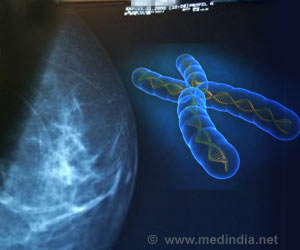A better understanding of how the Wnt and Notch signaling pathways interact could help identify an underlying cause of breast carcinogenesis.
A protein present in the human breast epithelial cells called Frizzled7 (FZD7), a component of Wnt signaling pathway is controlled by the Notch signaling pathway, which play key roles in mammary gland formation and breast cancer development, says a new study.
Evidence supporting the potential ability to regulate Notch-mediated Wnt signaling by targeting the NOTCH3-FZD7signaling network is presented in the study published in
Stem Cells and Development.
Vasudeva Bhat, Yu Jia Sun, Steve Weger, and Afshin Raouf, University Manitoba and CancerCare Manitoba, Winnipeg, Canada, determined how the Notch signaling pathway uniquely regulates a specific component of the Wnt signaling pathway--the FZD7receptor--in human breast epithelial cells. A better understanding of how the two pathways interact could help identify an underlying cause of breast carcinogenesis.
TOP INSIGHT
Notch-induced expression of FZD7- in human breast epithelial cells is controlled only by the NOTCH3 receptor in a unique way.
In the article "Notch-induced Expression of FZD7 Required Noncanonical NOTCH3 Signaling in Human Breast Epithelial Cells", the researchers provide evidence that Notch-induced expression of FZD7 is controlled only by the NOTCH3 receptor and in a unique way that differs from other demonstrated mechanisms of Notch-mediated modulation of the Wnt signaling pathway.
"This paper explodes the dogma that there is redundancy across all Notch receptors in binding, nucleation, and subsequent activation of target genes," says Editor-in-Chief Graham C. Parker, PhD, The Carman and Ann Adams Department of Pediatrics, Wayne State University School of Medicine, Detroit, MI. "These results are acutely of interest to breast cancer researchers but also have wider implications for our understanding of normal development."
Source-Eurekalert

 MEDINDIA
MEDINDIA




 Email
Email










